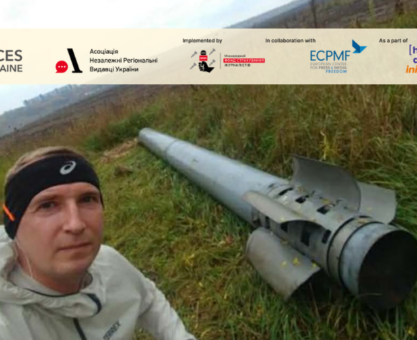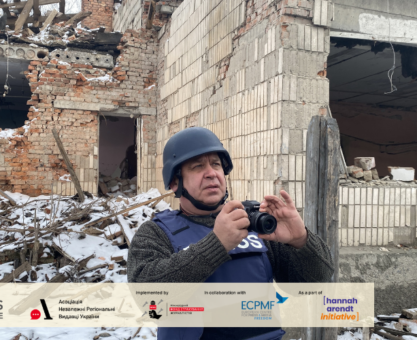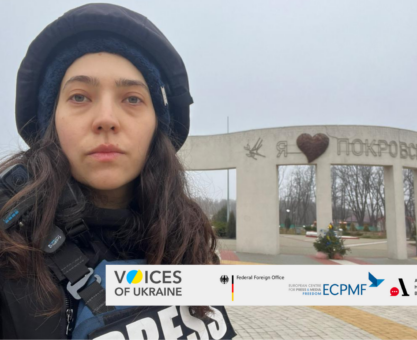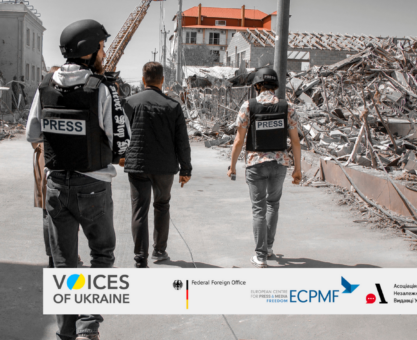The profession of journalism in wartime requires not only endurance but also systematic support. Insurance is one of the most important elements of safety for those who work in combat zones, record the truth, and report from the most dangerous places.
On the front lines, the truth needs protection. But those who seek it — journalists, fixers, cameramen — need even greater protection. Insurance has become not just a formality, but a vital element of professional media work in Ukraine during the war. ‘Our task is to ensure that independent journalism in Ukraine remains alive, strong and protected,’ says AIRPPU CEO Oksana Brovko. ‘Because without journalists, there is no truth. And without truth, there is no justice.’
From January 2024 to June 2025, the International Insurance Fund for Journalists (IIFJ), an initiative of the AIRPPU and five civil society organisations (the Souspilnist Foundation, IMI, Detector Media, CEDEM, RDPI), implemented a large-scale programme to support media workers operating in high-risk areas. The programme covered not only personal insurance, but also safety training, psychological support, information campaigns, and strengthening the media community.
Overall, the IIFJ project started at the beginning of the war, and within its framework, AIRPPU cooperates with various international partners. Initially, the initiative was supported by the World Association of News Publishers (WAN-IFRA), and in recent years, our international partner has been the European Centre for Press and Media Freedom (ECPMF).
What has been achieved
In a year and a half, we have insured 92 media workers (54 men and 38 women) — journalists, videographers, fixers — for a total of 1,230 days of exposure to dangerous conditions.

During this period, we received 704 applications, of which 633 were approved, including one confirmed insurance claim. Since the establishment of the IIFJ, we have received a total of 1,015 applications for 2,196 insurance days with a total coverage of $100,000.
At the same time, we organised training courses on physical and psychological safety, which were attended by over 100 participants. These included HEFAT (Hostile Environment and First Aid Training) courses, skills for working in extreme conditions, consultations with psychologists, a seminar, and a conference.
“Thanks to the training sessions, psychological support, insurance, and information campaigns, the project has become an important resource for protecting media workers and increasing their readiness to work in high-risk conditions,” says Oksana Brovko.
Training participants improved their understanding of personal protective equipment, first aid kits, and what to do in case of cardiac arrest and acute stress.
Journalists noted the importance of such support. For example, Maria Moroz from Ukrainian Witness said: “Our film crews have been hit more than once… after that, we became much more cautious. Insurance is a very valuable find… you can worry a little less about what to do if something happens.”
UNITED24 producer Natalia Kondrasheva explained: “We practically never go on assignment without insurance. It has become more difficult to work. The most common threats are FPV drone attacks, artillery, and air strikes.”
Challenges and teamwork
The AIRPPU team responded effectively to changes — trip cancellations, mobilisation of participants, urgent requests. One of the coordinators, Anna Fursenko, recalls: “Working on the project means being part of a team that breathes in unison. We provide a sense of support to those who work in difficult conditions, which is a great honour and responsibility.”

“We faced many challenges in the course of our work: night trips, unscheduled requests, mobilisation of journalists. But each time, our team acted as a single organism. It’s not just about administrative efficiency — it’s about human support in the most critical moments,” explains Oksana Brovko.
Other editorial offices also felt the importance of rapid interaction. Alona Yatsyna, editor-in-chief of “Kordon.Media”, emphasised: “Once, confirmation of a trip for the team came at night. By 6 a.m., the journalists were already on their way… We have developed internal security protocols and have our own risk assessment scale.”
Legislative confirmation
On 12 June 2025, the President of Ukraine signed Law No. 11153, which obliges the media to insure journalists and other employees for the period of their business trips to combat zones or temporarily occupied territories (areas currently under Russian military control due to the ongoing war in Ukraine). The details of the insurance will be determined by the Ministry of Culture and Strategic Communications.
“The media community has worked hard to lobby for this amendment to the legislation,” notes Oksana Brovko. “After all, insurance for media workers is extremely important. It is difficult to overestimate the importance of the safety and protection of media workers while they are in particularly dangerous areas. Verified, high-quality content in the form of reports, news, and stories is an integral part of our fight.”
This is legal confirmation that the safety of journalists is not an exception, but an obligation. Our project has been implementing the idea of insurance since the first weeks of the full-scale war — it can be said that our initiative is now supported at the state level.
Impact and future
The year-and-a-half-long project has been completed, but its impact will be long-lasting. Journalists retain their skills, apply safety protocols, and continue to work on the front lines. The media content created as part of the project documents war crimes, helps human rights defenders, and serves as evidence for the world.
‘We are not an insurance company; we are the ones who organise the process of free insurance so that independent media feel safer. Our project has become a point of support for many media outlets. It allows them to work in dangerous areas without fear, with a sense of protection — and therefore with inner freedom,’ says Oksana Brovko, insurance project leader and CEO of the Association of Independent Regional Press Publishers of Ukraine (AIRPPU).
***
We would like to remind you that the insurance project is being implemented by the Association of Independent Regional Press Publishers of Ukraine together with its partners. The initiative is part of the Voices of Ukraine programme, which is coordinated by the European Centre for Press and Media Freedom (ECPMF). Voices of Ukraine is implemented within the framework of the Hannah Arendt Initiative and is funded by the German Federal Foreign Office.




















